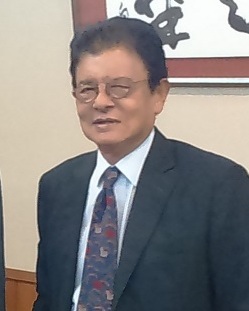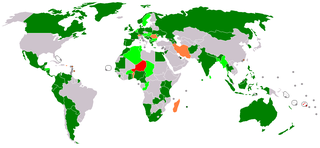
Tun Musa bin Hitam is a Malaysian former politician who was Deputy Prime Minister of Malaysia from 1981 to 1986, serving under Mahathir Mohamad. He was the chairman of Sime Darby Berhad.

Razali bin Ismail is a Malaysian diplomat. He is formerly the Chairman of the Human Rights Commission of Malaysia (SUHAKAM) from 2016 to 2019. He was also the 51st President of the United Nations General Assembly from 1996 until 1997.

The Australian Human Rights Commission is the national human rights institution of Australia, established in 1986 as the Human Rights and Equal Opportunity Commission (HREOC) and renamed in 2008. It is a statutory body funded by, but operating independently of, the Australian Government. It is responsible for investigating alleged infringements of Australia's anti-discrimination legislation in relation to federal agencies.
A national human rights institution (NHRI) is an independent state-based institution with the responsibility to broadly protect and promote human rights in a given country. The growth of such bodies has been encouraged by the Office of the United Nations High Commissioner for Human Rights (OHCHR), which has provided advisory and support services, and facilitated access for NHRIs to the United Nations (UN) treaty bodies and other committees. There are over one hundred such institutions, about two-thirds assessed by peer review as compliant with the United Nations standards set out in the Paris Principles. Compliance with the Principles is the basis for accreditation at the UN, which, uniquely for NHRIs, is not conducted directly by a UN body but by a sub-committee of the Global Alliance of National Human Rights Institutions (GANHRI) called the Sub-Committee on Accreditation. The secretariat to the review process is provided by the National Institutions and Regional Mechanisms Section of the OHCHR.
The Northern Ireland Human Rights Commission (NIHRC) is a non-departmental public body funded through the Northern Ireland Office but operating independently of government as the national human rights institution (NHRI) for Northern Ireland. It came into existence on 1 March 1999, having been created by the Parliament of the United Kingdom through section 68 of the Northern Ireland Act 1998, in compliance with a commitment made by the UK Government in the Belfast Agreement of 10 April 1998. Its powers were amended by the Justice and Security Act 2007.

The Memali Incident or code-named as Operasi Angkara and Operasi Hapus was a major incident that occurred in the remote village of Kampung Memali, Baling in the Malaysian state of Kedah on 19 November 1985.

Mohd Faizal Musa, also known under the pen name Faisal Tehrani, is a Malaysian author and playwright. Due to the frequent writing and ideas he was known as a controversial person. He is the author of many books and literary works of various lengths, including stage plays. National Laureate Anwar Ridwan praises of Faisal's writing "conscious of high literature and full of vision."
The Scottish Human Rights Commission (SHRC) is the national human rights institution for Scotland. It was established by the Scottish Commission for Human Rights Act and started its work in 2008. The Commission is independent of the Scottish and UK Government, and of Parliament.
The Asia Pacific Forum (APF) is one of four regional networks of national human rights institutions (NHRIs) within the International Co-ordinating Committee of NHRIs. The APF formerly accredited NHRIs for compliance with the United Nations' Paris Principles, but now acknowledges the accreditation decisions of an ICC sub-committee on which the APF has one of the four (regional) seats.

The Global Alliance of National Human Rights Institutions (GANHRI), formerly known as the 'International Coordinating Committee of National Human Rights Institutions', is a global network of national human rights institutions (NHRIs) – administrative bodies set up to promote, protect and monitor human rights in a given country. The GANHRI, whose full legal title is the "Global Alliance for National Human Rights Institutions", coordinates the relationship between NHRIs and the United Nations human rights system, and is unique as the only non-UN body whose internal accreditation system, based on compliance with the 1993 Paris Principles, grants access to UN committees. Institutions accredited by the Subcommittee for Accreditation (SCA) of the GANHRI with "A status", meaning full compliance with the Paris Principles, are usually accorded speaking rights and seating at human rights treaty bodies and other UN organs, mainly to the Human Rights Council. The GANHRI representative often presents statements on behalf of individual NHRIs or the regional groups.
The Network of African National Human Rights Institutions (NANHRI) is one of four regional groupings within the global network, the Global Alliance for National Human Rights Institutions (GANHRI). NANHRI promotes the establishment of national human rights institutions throughout Africa, and supports co-operation and training to strengthen and develop the monitoring, promotion, protection and advocacy work of African NHRIs.
The Network of National Institutions in the Americas is one of four regional groups of national human rights institutions (NHRIs) within the global network, the International Co-ordinating Committee of NHRIs. The Americas group, which largely consists of ombudsman agencies rather than multi-member human rights commissions, is currently chaired by the National Human Rights Commission of Mexico, which represents the region on the ICC Bureau.

The Prime Minister's Department is a federal government ministry in Malaysia. Its objective is "determining the services of all divisions are implemented according to policy, legislation / regulations and current guidelines". It is headed by the Prime Minister of Malaysia followed by other Minister in the Prime Minister's Department. The Department consists of the Prime Minister's Office, the Deputy Prime Minister's Office and more than 50 other government agencies and entities. The Prime Minister's Department was established on July 1957. Its headquarters are in Perdana Putra, Putrajaya.
The National Centre for Human Rights (NCHR) is the national human rights institution of Jordan.
The National Commission on Human Rights is the national human rights institution (NHRI) of Indonesia. As with other NHRIs, its principal functions are the protection and promotion of human rights.
The European Network of National Human Rights Institutions (ENNHRI) is a membership international not-for-profit association (AISBL) under Belgian law. In 2013 it established its Permanent Secretariat in Brussels bringing together National Human Rights Institutions (NHRIs) from across the wider European region. Formerly known as European Group of National Human Rights Institutions, ENNHRI has been actively working in the field of promotion and protection of human rights in wider Europe for 15 years. ENNHRI essentially assists in the establishment and accreditation of European NHRIs, coordinates the exchange of information and best practices among its members, facilitates capacity building and training, engages with international and regional mechanisms for protection and promotion of human right and intervenes on legal and policy developments in Europe.

The Independent Commission for Human Rights (ICHR) is the national human rights institution of Palestine.
Raymond Koh Keng Joo is a Christian pastor from Malaysia who was abducted by the Royal Malaysia Police on 13 February 2017. As of August 2022, Koh was still missing with no further information.
Amri Che Mat is a Malaysian social activist from Perlis state, Malaysia, who was abducted on 24 November 2016. He was one of a number of social activists who have gone missing during the same time period, including pastors Raymond Koh and Joshua Hilmy, the latter of whom disappeared along with his wife, Ruth.

The Human Rights and Constitutional Affairs Select Committee is one of many select committees of the Malaysian House of Representatives. It is among four new bipartisan parliamentary select committees announced by the Minister in the Prime Minister's Department in charge of legal affairs, Liew Vui Keong, on 17 October 2019 in an effort to improve the institutional system. The creation saw the portfolio of human rights being moved from the previous Rights and Gender Equality Select Committee, now known as the Gender Equality and Family Development Select Committee.








